Civil Law Assignment: Examining the Challenges and Impacts of Brexit
VerifiedAdded on 2022/08/29
|9
|1995
|14
Essay
AI Summary
This Civil Law assignment provides a detailed analysis of Brexit, the United Kingdom's decision to leave the European Union. It begins with an introduction to Brexit, tracing its origins from the 2016 referendum and the subsequent political maneuvers. The assignment explores the challenges the UK government faces during the withdrawal process, including negotiations, public opinion, and the rule of law. It examines the tension between globalization and sovereignty in the context of Brexit, highlighting potential benefits such as cost savings and increased autonomy, alongside disadvantages like economic slowdown. The assignment further investigates the impacts of Brexit on the single market, Northern Ireland, and human rights, including immigration rights and the Charter of Fundamental Rights. The conclusion offers lessons learned from the Brexit process, emphasizing the complexities of disintegration, the limitations of direct democracy, and the importance of considering all consequences before taking action. The assignment draws on various sources, including books, journals, and online resources, to support its analysis.
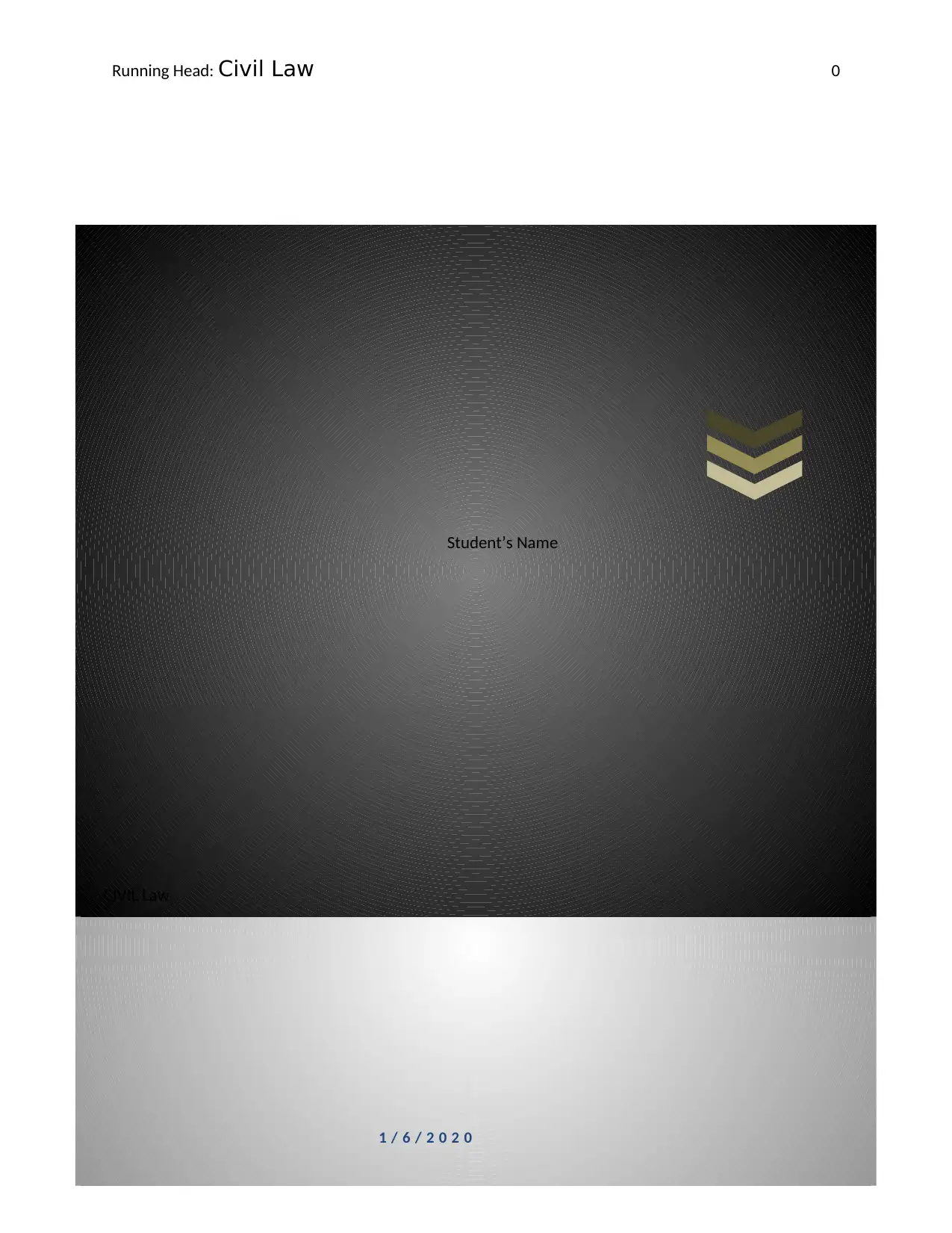
CIVIL Law
Running Head: Civil Law 0
1 / 6 / 2 0 2 0
Student’s Name
Running Head: Civil Law 0
1 / 6 / 2 0 2 0
Student’s Name
Paraphrase This Document
Need a fresh take? Get an instant paraphrase of this document with our AI Paraphraser
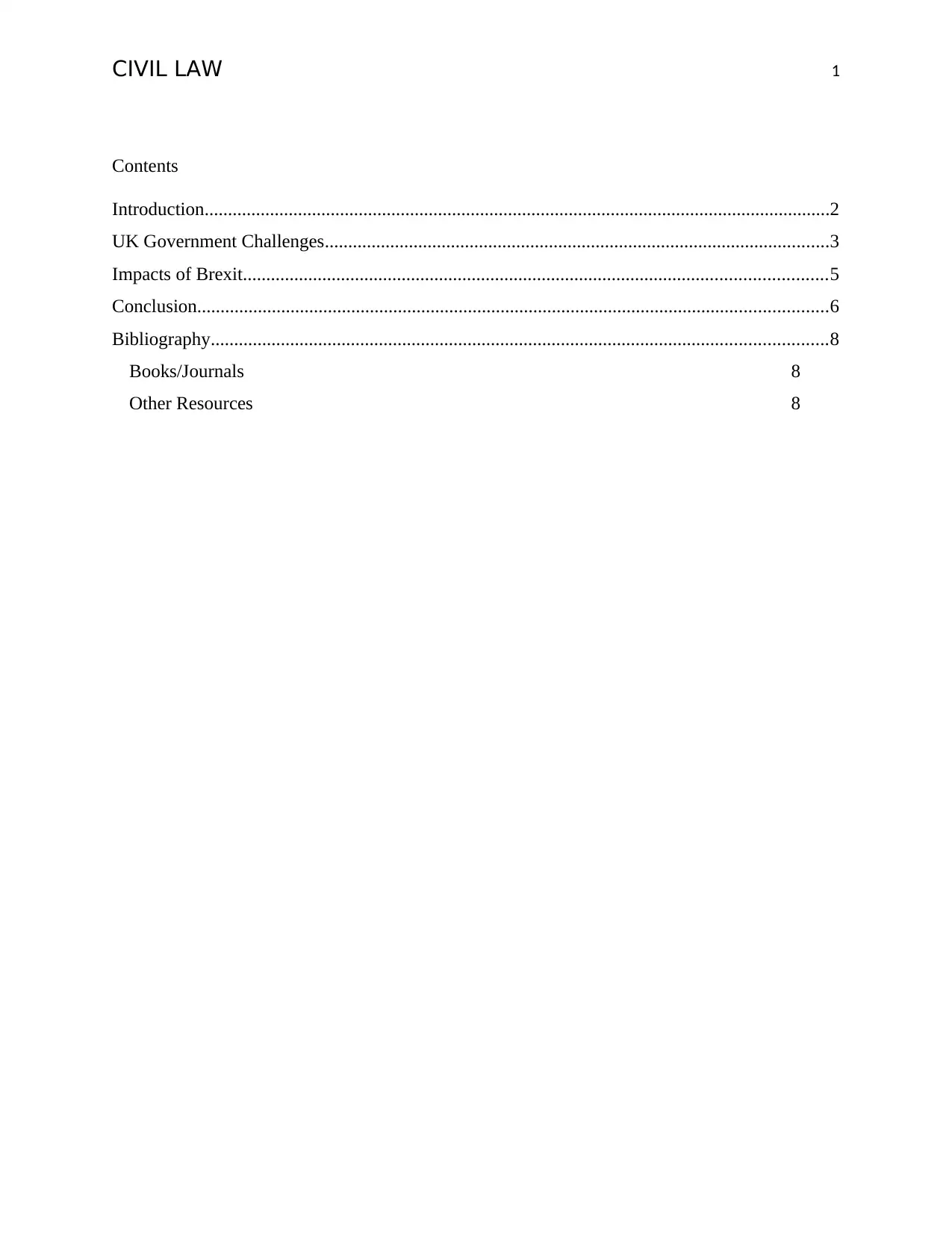
CIVIL LAW 1
Contents
Introduction......................................................................................................................................2
UK Government Challenges............................................................................................................3
Impacts of Brexit.............................................................................................................................5
Conclusion.......................................................................................................................................6
Bibliography....................................................................................................................................8
Books/Journals 8
Other Resources 8
Contents
Introduction......................................................................................................................................2
UK Government Challenges............................................................................................................3
Impacts of Brexit.............................................................................................................................5
Conclusion.......................................................................................................................................6
Bibliography....................................................................................................................................8
Books/Journals 8
Other Resources 8
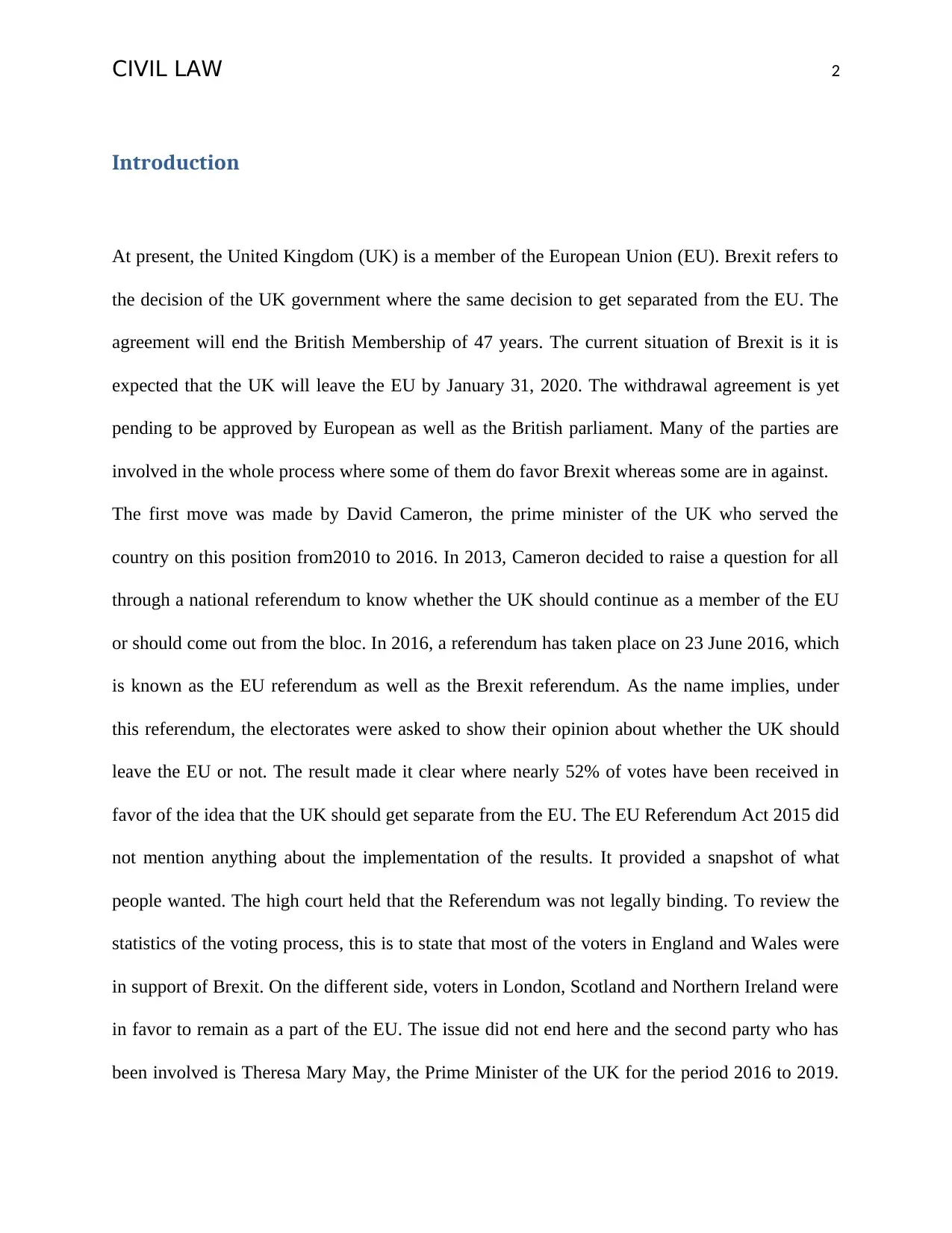
CIVIL LAW 2
Introduction
At present, the United Kingdom (UK) is a member of the European Union (EU). Brexit refers to
the decision of the UK government where the same decision to get separated from the EU. The
agreement will end the British Membership of 47 years. The current situation of Brexit is it is
expected that the UK will leave the EU by January 31, 2020. The withdrawal agreement is yet
pending to be approved by European as well as the British parliament. Many of the parties are
involved in the whole process where some of them do favor Brexit whereas some are in against.
The first move was made by David Cameron, the prime minister of the UK who served the
country on this position from2010 to 2016. In 2013, Cameron decided to raise a question for all
through a national referendum to know whether the UK should continue as a member of the EU
or should come out from the bloc. In 2016, a referendum has taken place on 23 June 2016, which
is known as the EU referendum as well as the Brexit referendum. As the name implies, under
this referendum, the electorates were asked to show their opinion about whether the UK should
leave the EU or not. The result made it clear where nearly 52% of votes have been received in
favor of the idea that the UK should get separate from the EU. The EU Referendum Act 2015 did
not mention anything about the implementation of the results. It provided a snapshot of what
people wanted. The high court held that the Referendum was not legally binding. To review the
statistics of the voting process, this is to state that most of the voters in England and Wales were
in support of Brexit. On the different side, voters in London, Scotland and Northern Ireland were
in favor to remain as a part of the EU. The issue did not end here and the second party who has
been involved is Theresa Mary May, the Prime Minister of the UK for the period 2016 to 2019.
Introduction
At present, the United Kingdom (UK) is a member of the European Union (EU). Brexit refers to
the decision of the UK government where the same decision to get separated from the EU. The
agreement will end the British Membership of 47 years. The current situation of Brexit is it is
expected that the UK will leave the EU by January 31, 2020. The withdrawal agreement is yet
pending to be approved by European as well as the British parliament. Many of the parties are
involved in the whole process where some of them do favor Brexit whereas some are in against.
The first move was made by David Cameron, the prime minister of the UK who served the
country on this position from2010 to 2016. In 2013, Cameron decided to raise a question for all
through a national referendum to know whether the UK should continue as a member of the EU
or should come out from the bloc. In 2016, a referendum has taken place on 23 June 2016, which
is known as the EU referendum as well as the Brexit referendum. As the name implies, under
this referendum, the electorates were asked to show their opinion about whether the UK should
leave the EU or not. The result made it clear where nearly 52% of votes have been received in
favor of the idea that the UK should get separate from the EU. The EU Referendum Act 2015 did
not mention anything about the implementation of the results. It provided a snapshot of what
people wanted. The high court held that the Referendum was not legally binding. To review the
statistics of the voting process, this is to state that most of the voters in England and Wales were
in support of Brexit. On the different side, voters in London, Scotland and Northern Ireland were
in favor to remain as a part of the EU. The issue did not end here and the second party who has
been involved is Theresa Mary May, the Prime Minister of the UK for the period 2016 to 2019.
⊘ This is a preview!⊘
Do you want full access?
Subscribe today to unlock all pages.

Trusted by 1+ million students worldwide
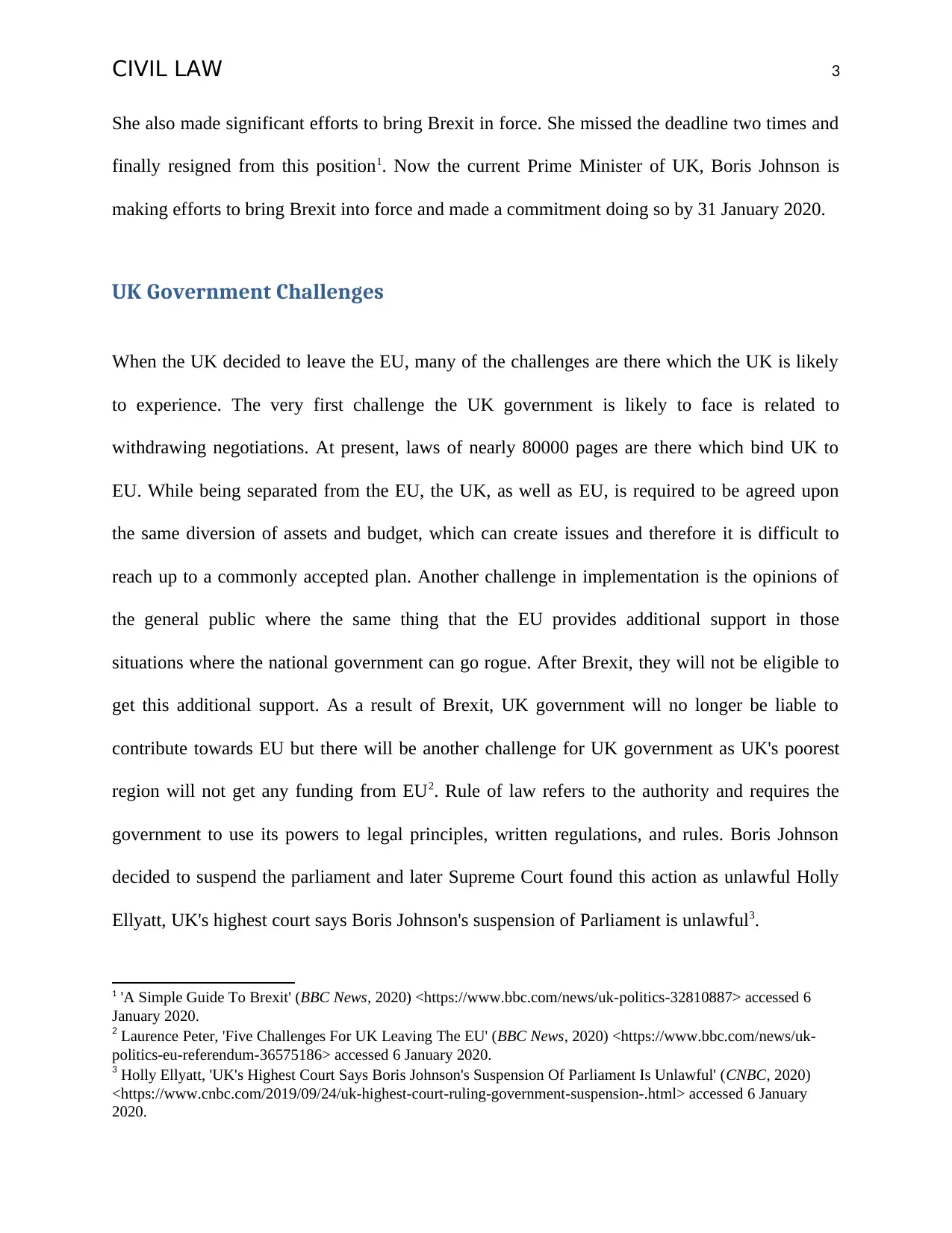
CIVIL LAW 3
She also made significant efforts to bring Brexit in force. She missed the deadline two times and
finally resigned from this position1. Now the current Prime Minister of UK, Boris Johnson is
making efforts to bring Brexit into force and made a commitment doing so by 31 January 2020.
UK Government Challenges
When the UK decided to leave the EU, many of the challenges are there which the UK is likely
to experience. The very first challenge the UK government is likely to face is related to
withdrawing negotiations. At present, laws of nearly 80000 pages are there which bind UK to
EU. While being separated from the EU, the UK, as well as EU, is required to be agreed upon
the same diversion of assets and budget, which can create issues and therefore it is difficult to
reach up to a commonly accepted plan. Another challenge in implementation is the opinions of
the general public where the same thing that the EU provides additional support in those
situations where the national government can go rogue. After Brexit, they will not be eligible to
get this additional support. As a result of Brexit, UK government will no longer be liable to
contribute towards EU but there will be another challenge for UK government as UK's poorest
region will not get any funding from EU2. Rule of law refers to the authority and requires the
government to use its powers to legal principles, written regulations, and rules. Boris Johnson
decided to suspend the parliament and later Supreme Court found this action as unlawful Holly
Ellyatt, UK's highest court says Boris Johnson's suspension of Parliament is unlawful3.
1 'A Simple Guide To Brexit' (BBC News, 2020) <https://www.bbc.com/news/uk-politics-32810887> accessed 6
January 2020.
2 Laurence Peter, 'Five Challenges For UK Leaving The EU' (BBC News, 2020) <https://www.bbc.com/news/uk-
politics-eu-referendum-36575186> accessed 6 January 2020.
3 Holly Ellyatt, 'UK's Highest Court Says Boris Johnson's Suspension Of Parliament Is Unlawful' (CNBC, 2020)
<https://www.cnbc.com/2019/09/24/uk-highest-court-ruling-government-suspension-.html> accessed 6 January
2020.
She also made significant efforts to bring Brexit in force. She missed the deadline two times and
finally resigned from this position1. Now the current Prime Minister of UK, Boris Johnson is
making efforts to bring Brexit into force and made a commitment doing so by 31 January 2020.
UK Government Challenges
When the UK decided to leave the EU, many of the challenges are there which the UK is likely
to experience. The very first challenge the UK government is likely to face is related to
withdrawing negotiations. At present, laws of nearly 80000 pages are there which bind UK to
EU. While being separated from the EU, the UK, as well as EU, is required to be agreed upon
the same diversion of assets and budget, which can create issues and therefore it is difficult to
reach up to a commonly accepted plan. Another challenge in implementation is the opinions of
the general public where the same thing that the EU provides additional support in those
situations where the national government can go rogue. After Brexit, they will not be eligible to
get this additional support. As a result of Brexit, UK government will no longer be liable to
contribute towards EU but there will be another challenge for UK government as UK's poorest
region will not get any funding from EU2. Rule of law refers to the authority and requires the
government to use its powers to legal principles, written regulations, and rules. Boris Johnson
decided to suspend the parliament and later Supreme Court found this action as unlawful Holly
Ellyatt, UK's highest court says Boris Johnson's suspension of Parliament is unlawful3.
1 'A Simple Guide To Brexit' (BBC News, 2020) <https://www.bbc.com/news/uk-politics-32810887> accessed 6
January 2020.
2 Laurence Peter, 'Five Challenges For UK Leaving The EU' (BBC News, 2020) <https://www.bbc.com/news/uk-
politics-eu-referendum-36575186> accessed 6 January 2020.
3 Holly Ellyatt, 'UK's Highest Court Says Boris Johnson's Suspension Of Parliament Is Unlawful' (CNBC, 2020)
<https://www.cnbc.com/2019/09/24/uk-highest-court-ruling-government-suspension-.html> accessed 6 January
2020.
Paraphrase This Document
Need a fresh take? Get an instant paraphrase of this document with our AI Paraphraser
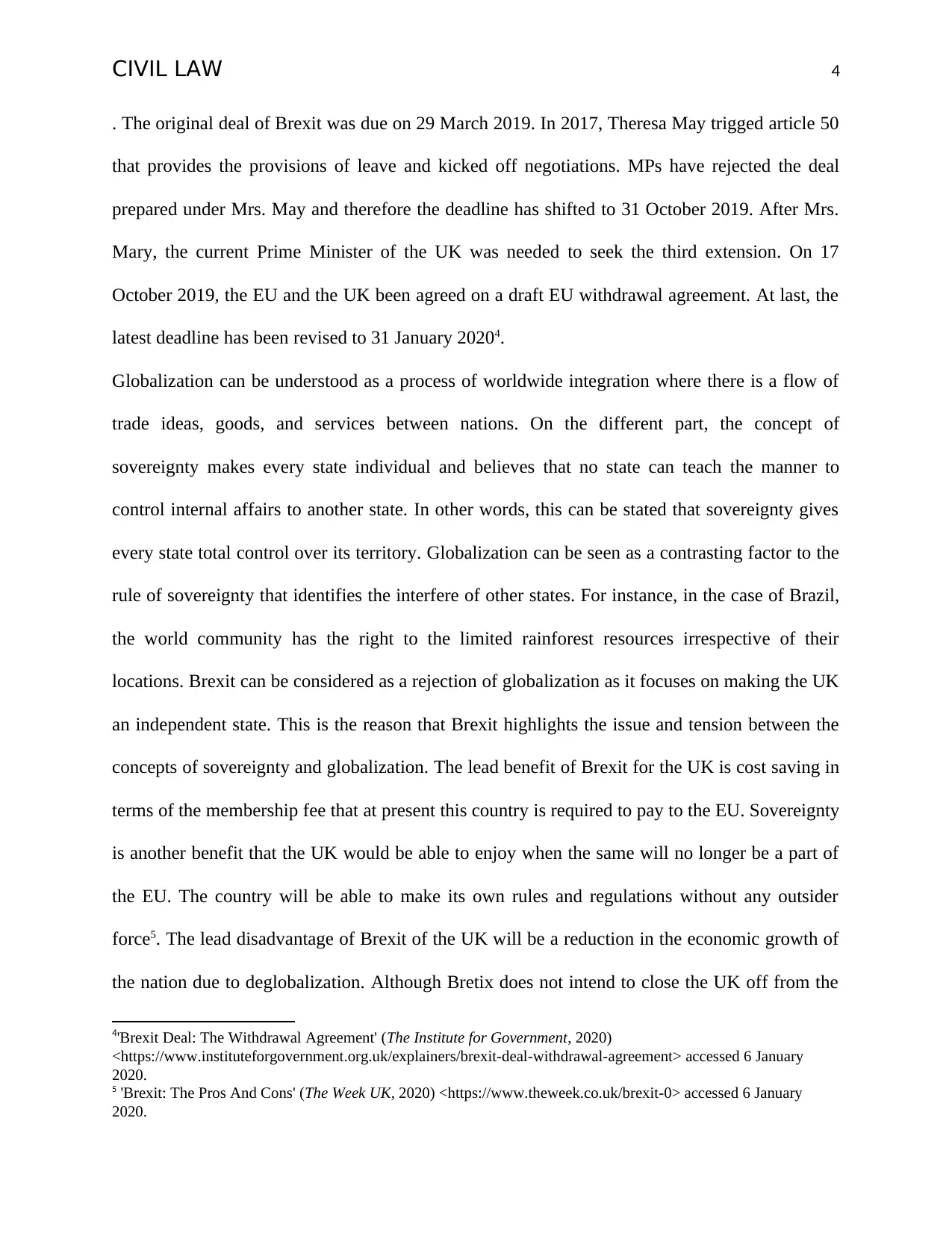
CIVIL LAW 4
. The original deal of Brexit was due on 29 March 2019. In 2017, Theresa May trigged article 50
that provides the provisions of leave and kicked off negotiations. MPs have rejected the deal
prepared under Mrs. May and therefore the deadline has shifted to 31 October 2019. After Mrs.
Mary, the current Prime Minister of the UK was needed to seek the third extension. On 17
October 2019, the EU and the UK been agreed on a draft EU withdrawal agreement. At last, the
latest deadline has been revised to 31 January 20204.
Globalization can be understood as a process of worldwide integration where there is a flow of
trade ideas, goods, and services between nations. On the different part, the concept of
sovereignty makes every state individual and believes that no state can teach the manner to
control internal affairs to another state. In other words, this can be stated that sovereignty gives
every state total control over its territory. Globalization can be seen as a contrasting factor to the
rule of sovereignty that identifies the interfere of other states. For instance, in the case of Brazil,
the world community has the right to the limited rainforest resources irrespective of their
locations. Brexit can be considered as a rejection of globalization as it focuses on making the UK
an independent state. This is the reason that Brexit highlights the issue and tension between the
concepts of sovereignty and globalization. The lead benefit of Brexit for the UK is cost saving in
terms of the membership fee that at present this country is required to pay to the EU. Sovereignty
is another benefit that the UK would be able to enjoy when the same will no longer be a part of
the EU. The country will be able to make its own rules and regulations without any outsider
force5. The lead disadvantage of Brexit of the UK will be a reduction in the economic growth of
the nation due to deglobalization. Although Bretix does not intend to close the UK off from the
4'Brexit Deal: The Withdrawal Agreement' (The Institute for Government, 2020)
<https://www.instituteforgovernment.org.uk/explainers/brexit-deal-withdrawal-agreement> accessed 6 January
2020.
5 'Brexit: The Pros And Cons' (The Week UK, 2020) <https://www.theweek.co.uk/brexit-0> accessed 6 January
2020.
. The original deal of Brexit was due on 29 March 2019. In 2017, Theresa May trigged article 50
that provides the provisions of leave and kicked off negotiations. MPs have rejected the deal
prepared under Mrs. May and therefore the deadline has shifted to 31 October 2019. After Mrs.
Mary, the current Prime Minister of the UK was needed to seek the third extension. On 17
October 2019, the EU and the UK been agreed on a draft EU withdrawal agreement. At last, the
latest deadline has been revised to 31 January 20204.
Globalization can be understood as a process of worldwide integration where there is a flow of
trade ideas, goods, and services between nations. On the different part, the concept of
sovereignty makes every state individual and believes that no state can teach the manner to
control internal affairs to another state. In other words, this can be stated that sovereignty gives
every state total control over its territory. Globalization can be seen as a contrasting factor to the
rule of sovereignty that identifies the interfere of other states. For instance, in the case of Brazil,
the world community has the right to the limited rainforest resources irrespective of their
locations. Brexit can be considered as a rejection of globalization as it focuses on making the UK
an independent state. This is the reason that Brexit highlights the issue and tension between the
concepts of sovereignty and globalization. The lead benefit of Brexit for the UK is cost saving in
terms of the membership fee that at present this country is required to pay to the EU. Sovereignty
is another benefit that the UK would be able to enjoy when the same will no longer be a part of
the EU. The country will be able to make its own rules and regulations without any outsider
force5. The lead disadvantage of Brexit of the UK will be a reduction in the economic growth of
the nation due to deglobalization. Although Bretix does not intend to close the UK off from the
4'Brexit Deal: The Withdrawal Agreement' (The Institute for Government, 2020)
<https://www.instituteforgovernment.org.uk/explainers/brexit-deal-withdrawal-agreement> accessed 6 January
2020.
5 'Brexit: The Pros And Cons' (The Week UK, 2020) <https://www.theweek.co.uk/brexit-0> accessed 6 January
2020.
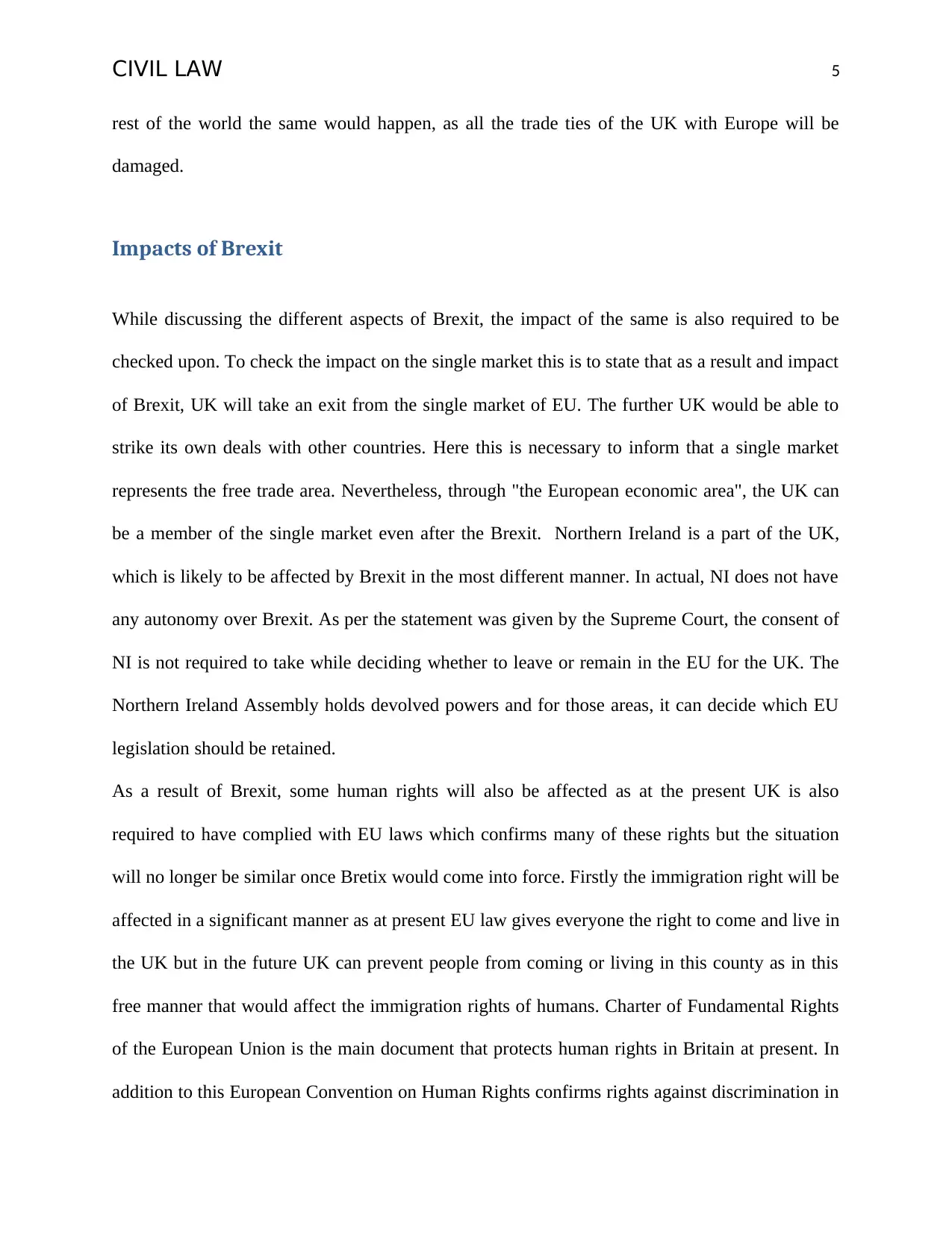
CIVIL LAW 5
rest of the world the same would happen, as all the trade ties of the UK with Europe will be
damaged.
Impacts of Brexit
While discussing the different aspects of Brexit, the impact of the same is also required to be
checked upon. To check the impact on the single market this is to state that as a result and impact
of Brexit, UK will take an exit from the single market of EU. The further UK would be able to
strike its own deals with other countries. Here this is necessary to inform that a single market
represents the free trade area. Nevertheless, through "the European economic area", the UK can
be a member of the single market even after the Brexit. Northern Ireland is a part of the UK,
which is likely to be affected by Brexit in the most different manner. In actual, NI does not have
any autonomy over Brexit. As per the statement was given by the Supreme Court, the consent of
NI is not required to take while deciding whether to leave or remain in the EU for the UK. The
Northern Ireland Assembly holds devolved powers and for those areas, it can decide which EU
legislation should be retained.
As a result of Brexit, some human rights will also be affected as at the present UK is also
required to have complied with EU laws which confirms many of these rights but the situation
will no longer be similar once Bretix would come into force. Firstly the immigration right will be
affected in a significant manner as at present EU law gives everyone the right to come and live in
the UK but in the future UK can prevent people from coming or living in this county as in this
free manner that would affect the immigration rights of humans. Charter of Fundamental Rights
of the European Union is the main document that protects human rights in Britain at present. In
addition to this European Convention on Human Rights confirms rights against discrimination in
rest of the world the same would happen, as all the trade ties of the UK with Europe will be
damaged.
Impacts of Brexit
While discussing the different aspects of Brexit, the impact of the same is also required to be
checked upon. To check the impact on the single market this is to state that as a result and impact
of Brexit, UK will take an exit from the single market of EU. The further UK would be able to
strike its own deals with other countries. Here this is necessary to inform that a single market
represents the free trade area. Nevertheless, through "the European economic area", the UK can
be a member of the single market even after the Brexit. Northern Ireland is a part of the UK,
which is likely to be affected by Brexit in the most different manner. In actual, NI does not have
any autonomy over Brexit. As per the statement was given by the Supreme Court, the consent of
NI is not required to take while deciding whether to leave or remain in the EU for the UK. The
Northern Ireland Assembly holds devolved powers and for those areas, it can decide which EU
legislation should be retained.
As a result of Brexit, some human rights will also be affected as at the present UK is also
required to have complied with EU laws which confirms many of these rights but the situation
will no longer be similar once Bretix would come into force. Firstly the immigration right will be
affected in a significant manner as at present EU law gives everyone the right to come and live in
the UK but in the future UK can prevent people from coming or living in this county as in this
free manner that would affect the immigration rights of humans. Charter of Fundamental Rights
of the European Union is the main document that protects human rights in Britain at present. In
addition to this European Convention on Human Rights confirms rights against discrimination in
⊘ This is a preview!⊘
Do you want full access?
Subscribe today to unlock all pages.

Trusted by 1+ million students worldwide
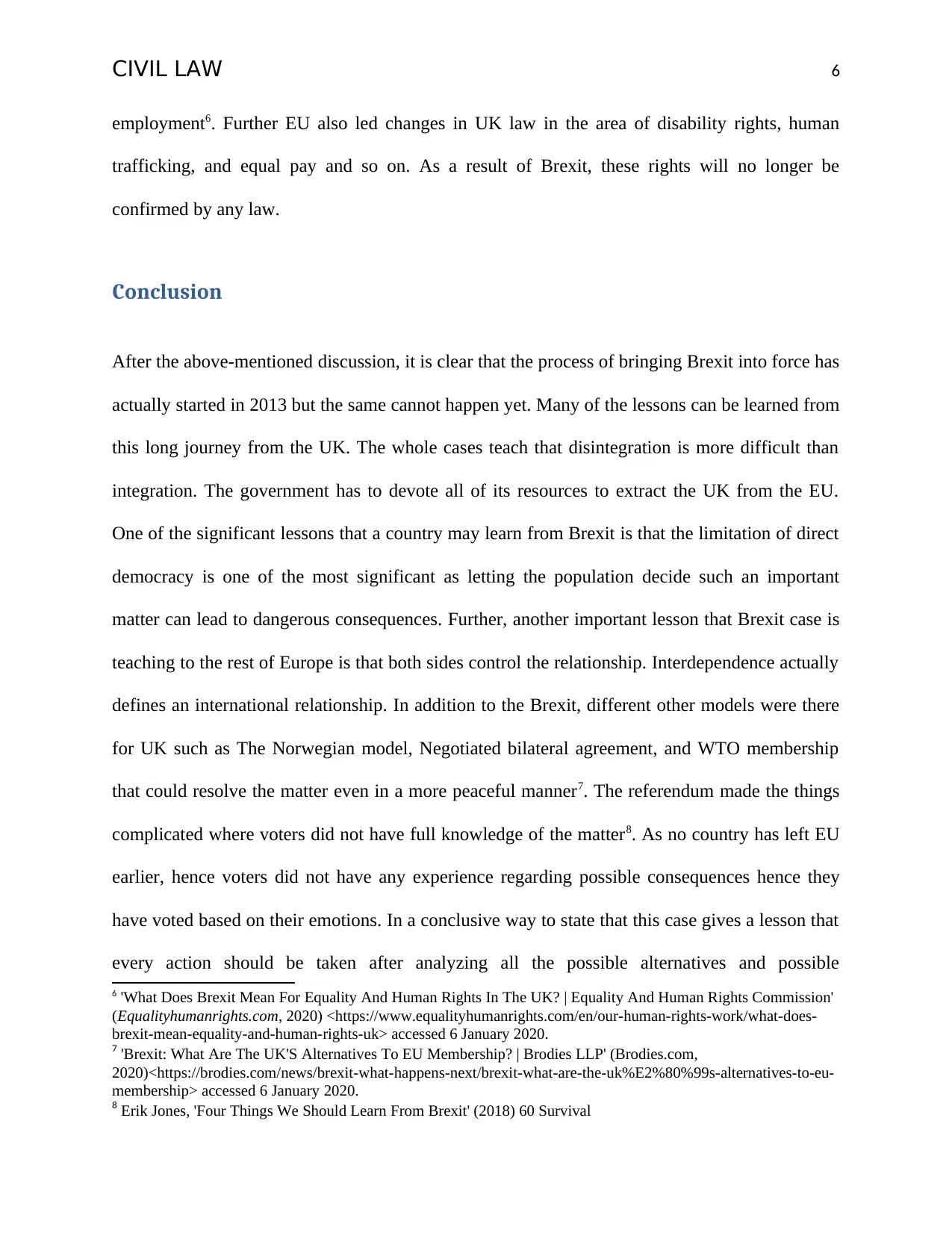
CIVIL LAW 6
employment6. Further EU also led changes in UK law in the area of disability rights, human
trafficking, and equal pay and so on. As a result of Brexit, these rights will no longer be
confirmed by any law.
Conclusion
After the above-mentioned discussion, it is clear that the process of bringing Brexit into force has
actually started in 2013 but the same cannot happen yet. Many of the lessons can be learned from
this long journey from the UK. The whole cases teach that disintegration is more difficult than
integration. The government has to devote all of its resources to extract the UK from the EU.
One of the significant lessons that a country may learn from Brexit is that the limitation of direct
democracy is one of the most significant as letting the population decide such an important
matter can lead to dangerous consequences. Further, another important lesson that Brexit case is
teaching to the rest of Europe is that both sides control the relationship. Interdependence actually
defines an international relationship. In addition to the Brexit, different other models were there
for UK such as The Norwegian model, Negotiated bilateral agreement, and WTO membership
that could resolve the matter even in a more peaceful manner7. The referendum made the things
complicated where voters did not have full knowledge of the matter8. As no country has left EU
earlier, hence voters did not have any experience regarding possible consequences hence they
have voted based on their emotions. In a conclusive way to state that this case gives a lesson that
every action should be taken after analyzing all the possible alternatives and possible
6 'What Does Brexit Mean For Equality And Human Rights In The UK? | Equality And Human Rights Commission'
(Equalityhumanrights.com, 2020) <https://www.equalityhumanrights.com/en/our-human-rights-work/what-does-
brexit-mean-equality-and-human-rights-uk> accessed 6 January 2020.
7 'Brexit: What Are The UK'S Alternatives To EU Membership? | Brodies LLP' (Brodies.com,
2020)<https://brodies.com/news/brexit-what-happens-next/brexit-what-are-the-uk%E2%80%99s-alternatives-to-eu-
membership> accessed 6 January 2020.
8 Erik Jones, 'Four Things We Should Learn From Brexit' (2018) 60 Survival
employment6. Further EU also led changes in UK law in the area of disability rights, human
trafficking, and equal pay and so on. As a result of Brexit, these rights will no longer be
confirmed by any law.
Conclusion
After the above-mentioned discussion, it is clear that the process of bringing Brexit into force has
actually started in 2013 but the same cannot happen yet. Many of the lessons can be learned from
this long journey from the UK. The whole cases teach that disintegration is more difficult than
integration. The government has to devote all of its resources to extract the UK from the EU.
One of the significant lessons that a country may learn from Brexit is that the limitation of direct
democracy is one of the most significant as letting the population decide such an important
matter can lead to dangerous consequences. Further, another important lesson that Brexit case is
teaching to the rest of Europe is that both sides control the relationship. Interdependence actually
defines an international relationship. In addition to the Brexit, different other models were there
for UK such as The Norwegian model, Negotiated bilateral agreement, and WTO membership
that could resolve the matter even in a more peaceful manner7. The referendum made the things
complicated where voters did not have full knowledge of the matter8. As no country has left EU
earlier, hence voters did not have any experience regarding possible consequences hence they
have voted based on their emotions. In a conclusive way to state that this case gives a lesson that
every action should be taken after analyzing all the possible alternatives and possible
6 'What Does Brexit Mean For Equality And Human Rights In The UK? | Equality And Human Rights Commission'
(Equalityhumanrights.com, 2020) <https://www.equalityhumanrights.com/en/our-human-rights-work/what-does-
brexit-mean-equality-and-human-rights-uk> accessed 6 January 2020.
7 'Brexit: What Are The UK'S Alternatives To EU Membership? | Brodies LLP' (Brodies.com,
2020)<https://brodies.com/news/brexit-what-happens-next/brexit-what-are-the-uk%E2%80%99s-alternatives-to-eu-
membership> accessed 6 January 2020.
8 Erik Jones, 'Four Things We Should Learn From Brexit' (2018) 60 Survival
Paraphrase This Document
Need a fresh take? Get an instant paraphrase of this document with our AI Paraphraser
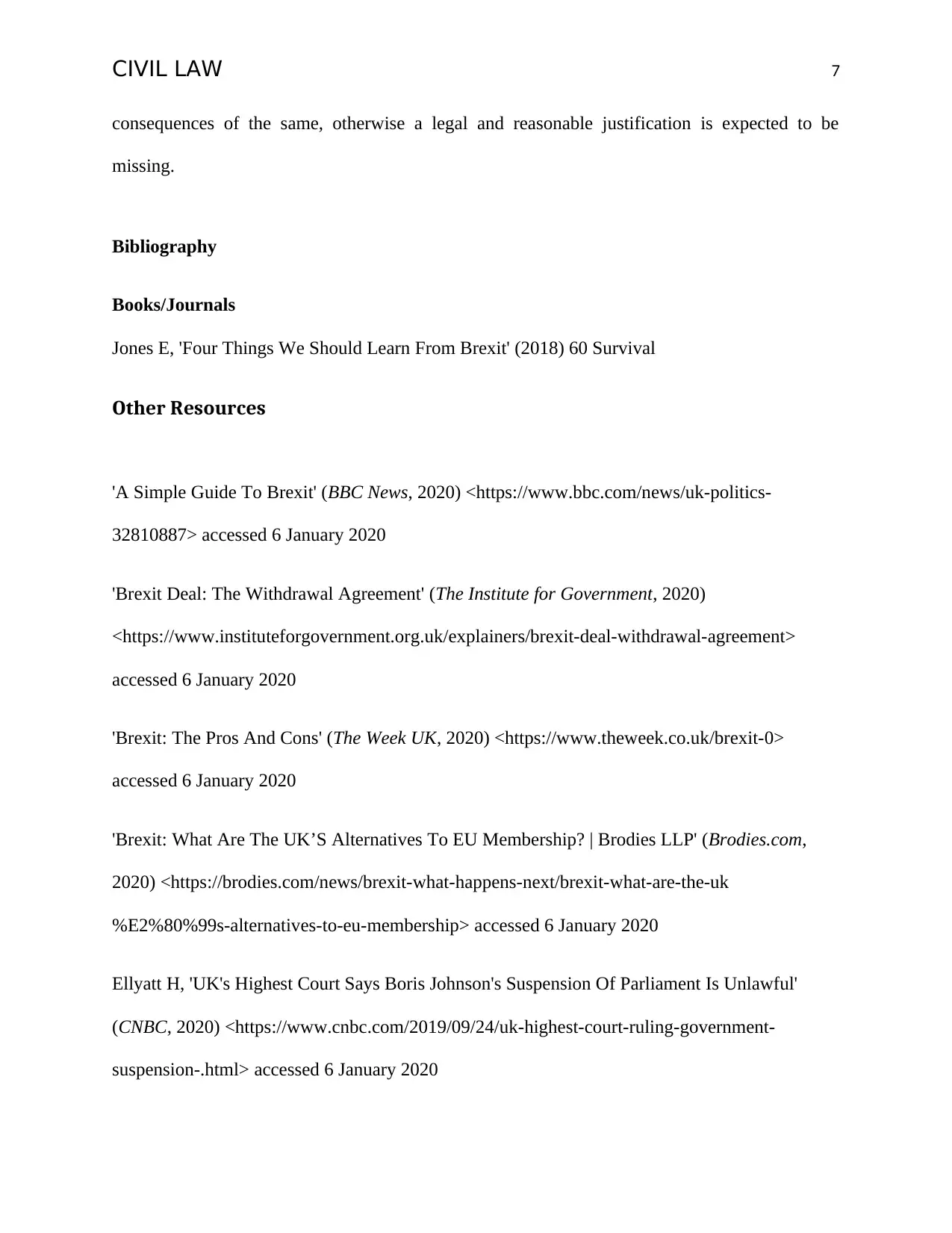
CIVIL LAW 7
consequences of the same, otherwise a legal and reasonable justification is expected to be
missing.
Bibliography
Books/Journals
Jones E, 'Four Things We Should Learn From Brexit' (2018) 60 Survival
Other Resources
'A Simple Guide To Brexit' (BBC News, 2020) <https://www.bbc.com/news/uk-politics-
32810887> accessed 6 January 2020
'Brexit Deal: The Withdrawal Agreement' (The Institute for Government, 2020)
<https://www.instituteforgovernment.org.uk/explainers/brexit-deal-withdrawal-agreement>
accessed 6 January 2020
'Brexit: The Pros And Cons' (The Week UK, 2020) <https://www.theweek.co.uk/brexit-0>
accessed 6 January 2020
'Brexit: What Are The UK’S Alternatives To EU Membership? | Brodies LLP' (Brodies.com,
2020) <https://brodies.com/news/brexit-what-happens-next/brexit-what-are-the-uk
%E2%80%99s-alternatives-to-eu-membership> accessed 6 January 2020
Ellyatt H, 'UK's Highest Court Says Boris Johnson's Suspension Of Parliament Is Unlawful'
(CNBC, 2020) <https://www.cnbc.com/2019/09/24/uk-highest-court-ruling-government-
suspension-.html> accessed 6 January 2020
consequences of the same, otherwise a legal and reasonable justification is expected to be
missing.
Bibliography
Books/Journals
Jones E, 'Four Things We Should Learn From Brexit' (2018) 60 Survival
Other Resources
'A Simple Guide To Brexit' (BBC News, 2020) <https://www.bbc.com/news/uk-politics-
32810887> accessed 6 January 2020
'Brexit Deal: The Withdrawal Agreement' (The Institute for Government, 2020)
<https://www.instituteforgovernment.org.uk/explainers/brexit-deal-withdrawal-agreement>
accessed 6 January 2020
'Brexit: The Pros And Cons' (The Week UK, 2020) <https://www.theweek.co.uk/brexit-0>
accessed 6 January 2020
'Brexit: What Are The UK’S Alternatives To EU Membership? | Brodies LLP' (Brodies.com,
2020) <https://brodies.com/news/brexit-what-happens-next/brexit-what-are-the-uk
%E2%80%99s-alternatives-to-eu-membership> accessed 6 January 2020
Ellyatt H, 'UK's Highest Court Says Boris Johnson's Suspension Of Parliament Is Unlawful'
(CNBC, 2020) <https://www.cnbc.com/2019/09/24/uk-highest-court-ruling-government-
suspension-.html> accessed 6 January 2020
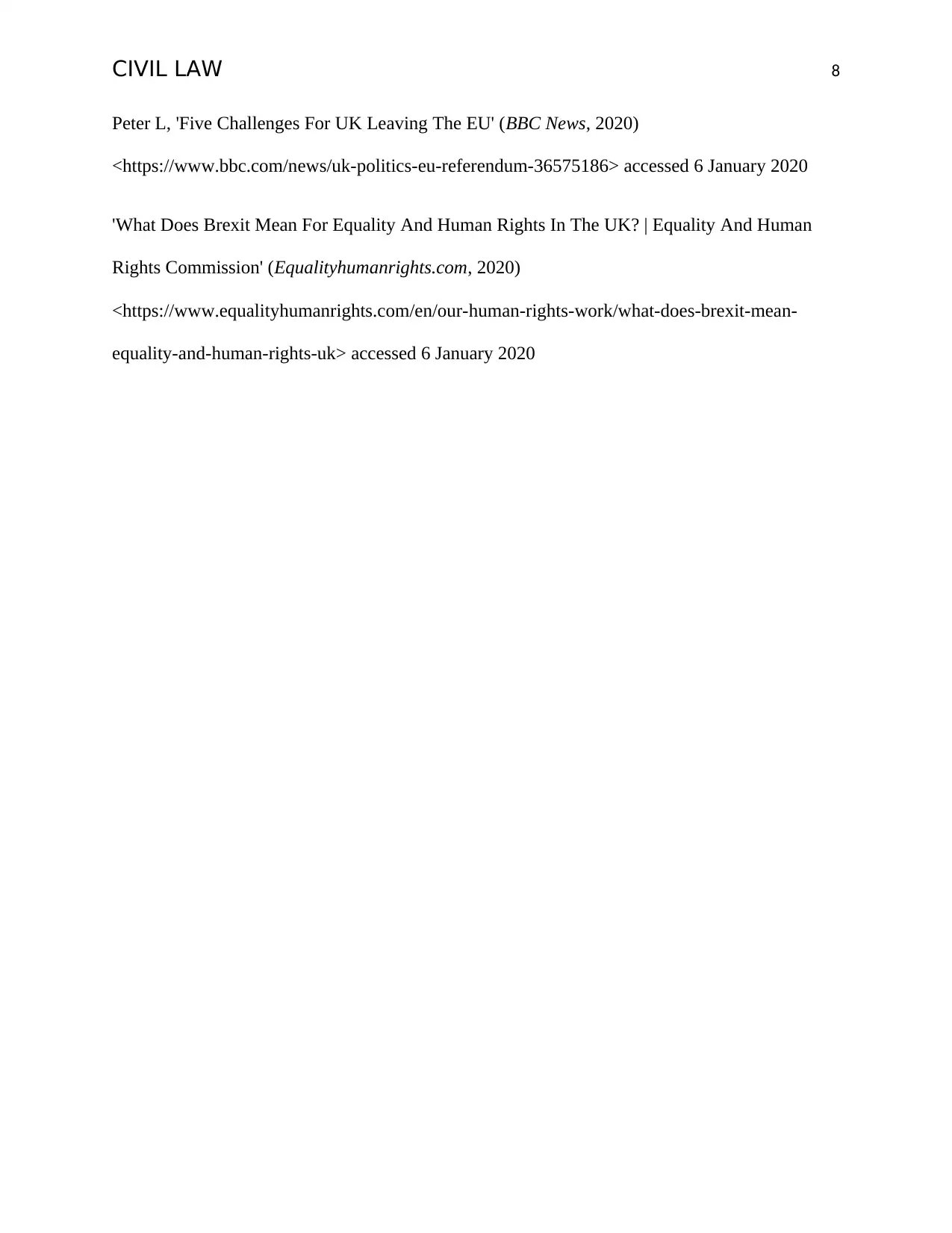
CIVIL LAW 8
Peter L, 'Five Challenges For UK Leaving The EU' (BBC News, 2020)
<https://www.bbc.com/news/uk-politics-eu-referendum-36575186> accessed 6 January 2020
'What Does Brexit Mean For Equality And Human Rights In The UK? | Equality And Human
Rights Commission' (Equalityhumanrights.com, 2020)
<https://www.equalityhumanrights.com/en/our-human-rights-work/what-does-brexit-mean-
equality-and-human-rights-uk> accessed 6 January 2020
Peter L, 'Five Challenges For UK Leaving The EU' (BBC News, 2020)
<https://www.bbc.com/news/uk-politics-eu-referendum-36575186> accessed 6 January 2020
'What Does Brexit Mean For Equality And Human Rights In The UK? | Equality And Human
Rights Commission' (Equalityhumanrights.com, 2020)
<https://www.equalityhumanrights.com/en/our-human-rights-work/what-does-brexit-mean-
equality-and-human-rights-uk> accessed 6 January 2020
⊘ This is a preview!⊘
Do you want full access?
Subscribe today to unlock all pages.

Trusted by 1+ million students worldwide
1 out of 9
Related Documents
Your All-in-One AI-Powered Toolkit for Academic Success.
+13062052269
info@desklib.com
Available 24*7 on WhatsApp / Email
![[object Object]](/_next/static/media/star-bottom.7253800d.svg)
Unlock your academic potential
Copyright © 2020–2026 A2Z Services. All Rights Reserved. Developed and managed by ZUCOL.





